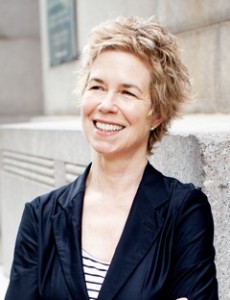
LISA F. JACKSON has been making documentary films for over 35 years – work that has brought her awards that include two Emmy awards and a Sundance Jury Prize. Sex Crimes Unit, her most recent film, is an unprecedented verite portrait of prosecutors in the Manhattan District Attorney’s Office as they work to bring justice to victims of sexual violence. Jackson shot her last documentary in the war zones of the Democratic Republic of the Congo. The Greatest Silence: Rape in the Congo won a Special Jury Prize for Documentaries at the 2008 Sundance Film Festival, earned 2 Emmy nominations and was broadcast on HBO.
1. How did you become interested and involved in film-making?
I went to film school at M.I.T. in the early 1970s. Part of my motivation was that it was a very feminist, very political era and I wanted to get involved in documentary filmmaking as a way of giving a voice to people who you didn’t normally hear. I was very much committed to documentary filmmaking and making films about real people in real life. That’s what I’ve been doing ever since.
2. What were the films/documentaries and who were the filmmakers who’ve inspired you to go into filmmaking?
That’s easy to answer. I saw a film by D.A. Pennebaker in the mid-Sixties called “Don’t Look Back” and it was a documentary about Bob Dylan and his tour of England in 1965. I’d never seen a film like that – I was fourteen years old and it completely blew me away. My professor in MIT was Richard Leacock and he along with Pennebaker were some of the founding fathers of cinéma vérité. So Pennebaker and Ricky Leacock (he was my mentor, my professor, and my friend for many, many years – he passed away just last year) were great inspiration. Bob Drew also made many films with Leacock in the Sixties, and they were also inspirations.
3. You’ve mentioned that you feel passionate about using film as an advocacy tool, and even as a bludgeon. How has this principle guided you in your work?
It’s a guiding principle – sometimes my films are an advocacy tool and sometimes entertainment, but most of the time they’re both. I think that all of my films have some sort of point of view, usually derived from the characters. I try to explore new subjects in every film I do, whether it is a film about the Barbie doll (which I gave a vey feminist slant) or a film about people who think they talk with the dead, when again, instead of just slamming the idea, I choose to explore both sides of the issue.
There are some issues where there is only one side, for instance, the film that I made in Congo was very specifically from the point of view of the women and the families who were suffering. Of course I talked to soldiers because I wanted to put a face to the source of the violence.
As for setting out to make an advocacy tool – I have this thing about a film needing to be a combination of spinach and ice cream. If you make a film that’s all spinach, nobody is going to find it appealing. You have to leaven it – whether it is with historical context (I think context is vitally important to any film you make) or with characters who inspire rather than 2-dimensional stand-ins for good and evil.
4. You tackle the extremely difficult subject of violence against women that makes audiences uncomfortable. Why did you choose this subject?
Because – at least in the Congo – nobody else did. Sometimes the subject is of such vital importance that people need to know and sometimes it’s what people don’t want to know and aren’t comfortable talking about. The idea of sexual violence as a weapon of war has been around for centuries but it’s not one that most of my viewing audience would have encountered and necessarily be comfortable with.
The extent of the violence in the Congo completely blew my mind when I visited it the first time. It was so under-reported. I had no idea what I was getting into or how bad it was and I felt that it was utterly vital as a journalist that I record these women and somehow tell the story of what was happening – in a part of the world that most people couldn’t find on a map.
Part two of this interview will be published on Monday 25 June 2012